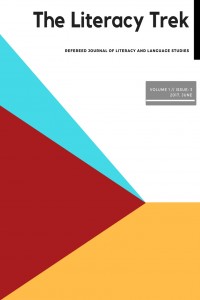Abstract
Hedges and boosters, as
significant indicators of epistemic modality, have recently grasped the
attention of scholars conducting research to explore the language use in
academic discourse. Hence, the study aims to reveal the hedges and boosters that
are utilized in academic articles and the frequency of the use of these
linguistic devices. The article presents findings from both education and
engineering. Twenty-four journal articles retrieved from leading research
journals were analyzed. The results were in line with the previous studies
indicating similarities as well as differences between the selected journals in
terms of the use of hedges and boosters.
Keywords
References
- Behnam, B., Naeimi, A., & Darvishzade, A. (2012). A comparative genre analysis of hedging expressions in research articles: Is fuzziness forever wicked? English Language and Literature Studies, (2)2, 20-38.
- Coates, J. (1987). Epistemic modality and spoken discourse. Transactions of the Philological Society, 85(1), 110-131.
- Doyuran, Z. (2009). Conciliation of knowledge through hedging in Turkish scientific articles. Journal of Faculty of Letters, (26)1, 85-99.
- Farrokhi, F., & Emami, S. (2008). Hedges and boosters in academic writing: Native vs. non-native research articles in applied linguistics and engineering. The Journal of Applied Linguistics, (1)2, 62-98.
- Hyland, K. (1996a). Writing without conviction? Hedging in science research articles. Applied Linguistics, 17, 4, 433-454.
- Hyland, K. (1996b). Talking to the academy: Forms of hedging in science research articles. Written Communication, 13(2), 251-281.
- Hyland, K. (1998). Boosting, hedging and the negotiation of academic knowledge. Text, 18(3), 349-382.
- Hyland, K. (2000). Hedges, boosters and lexical invisibility: Noticing modifiers in academic texts. Language Awareness, 9(4), 179-197.
- Kim, L. C., & Lim, J. M. H. (2015). Hedging in academic writing-A pedagogically-motivated qualitative study. Procedia-Social and Behavioral Sciences, 197, 600-607.
- Swales, J. M. (2004). Research genres: Exploration and applications. Cambridge: Cambridge University Press.
- Takimoto, M. (2015). A corpus-based analysis of hedges and boosters in English academic articles. Indonesian Journal of Applied Linguistics, 5(1), 95 – 105.
Abstract
References
- Behnam, B., Naeimi, A., & Darvishzade, A. (2012). A comparative genre analysis of hedging expressions in research articles: Is fuzziness forever wicked? English Language and Literature Studies, (2)2, 20-38.
- Coates, J. (1987). Epistemic modality and spoken discourse. Transactions of the Philological Society, 85(1), 110-131.
- Doyuran, Z. (2009). Conciliation of knowledge through hedging in Turkish scientific articles. Journal of Faculty of Letters, (26)1, 85-99.
- Farrokhi, F., & Emami, S. (2008). Hedges and boosters in academic writing: Native vs. non-native research articles in applied linguistics and engineering. The Journal of Applied Linguistics, (1)2, 62-98.
- Hyland, K. (1996a). Writing without conviction? Hedging in science research articles. Applied Linguistics, 17, 4, 433-454.
- Hyland, K. (1996b). Talking to the academy: Forms of hedging in science research articles. Written Communication, 13(2), 251-281.
- Hyland, K. (1998). Boosting, hedging and the negotiation of academic knowledge. Text, 18(3), 349-382.
- Hyland, K. (2000). Hedges, boosters and lexical invisibility: Noticing modifiers in academic texts. Language Awareness, 9(4), 179-197.
- Kim, L. C., & Lim, J. M. H. (2015). Hedging in academic writing-A pedagogically-motivated qualitative study. Procedia-Social and Behavioral Sciences, 197, 600-607.
- Swales, J. M. (2004). Research genres: Exploration and applications. Cambridge: Cambridge University Press.
- Takimoto, M. (2015). A corpus-based analysis of hedges and boosters in English academic articles. Indonesian Journal of Applied Linguistics, 5(1), 95 – 105.
Details
| Journal Section | Research Articles |
|---|---|
| Authors | |
| Publication Date | September 5, 2017 |
| Submission Date | June 6, 2017 |
| Published in Issue | Year 2017 Volume: 3 Issue: 1 |
 The content is licensed under a Creative Commons Attribution-NonCommercial 4.0 International License. Copyright rests with the author; The Literacy Trek must be referred properly.
The content is licensed under a Creative Commons Attribution-NonCommercial 4.0 International License. Copyright rests with the author; The Literacy Trek must be referred properly.


